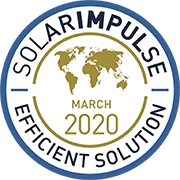The Solutions Explorer lets you create alerts that match your needs. You can create several alerts and you will receive a notification each time a new Solar Impulse Efficient Solutions is labelled and matches your filters.
Your Search Alerts will show up here.
Sign in to create alerts for your filters and search terms.
Sign inDon't have an account?
Sign upAccess exclusive opportunities for Investor Members Only
The Investment Hub is a platform by the Solar Impulse Foundation that connects innovators with investors to fund scalable and sustainable solutions. Through tailored matchmaking, e-pitches, and a collaborative digital environment, it helps drive impactful innovation forward.
Sign in to explore a world of dynamic and high-potential investment opportunities.
Sign inDon't have an account?
Sign upA new high performance protein for a world feed and food market

A new high performance protein for a world feed and food market
ŸnMeal™ is obtained by processing larvae of a mealworm (Tenebrio Molitor), reared on vegetal by-product. Insects comprise up to 40% of the natural food intake by fish, shrimps, chicken and pigs. Insects are part of a natural diet where they deliver an important source of high-quality protein and polyunsaturated fats. Premium proteins are necessary to maintain good health. Ÿnsect ŸnMealTM meets their nutritional requirements while offering easy digestibility and palatability. With the global population expected to grow to nine billion by 2050, current aquaculture and animal feeding practices are unsustainable. Compared to alternative animal and crop-based protein sources, insect farming is environmentally friendly: low greenhouse gas emissions, ocean biodiversity preservation, and dramatic improvements in land use productivity. Insects provide a new, natural, sustainable, and responsible resource to meet animal nutrition, pet food and agriculture supply needs while being carbon negative.
Ynsect
Ÿnsect farms and transforms insects in primary ingredients for animal feed (mainly aquaculture).
Agoranov
Agoranov is a public science & tech incubator.
The information set out above, is solely for the purposes of information and the Solar Impulse Foundation does not provide any guarantee as to its authenticity, completeness or accuracy. This information does not constitute investment advice or a recommendation to buy into, transact or to enter into any agreement with any of the parties or persons mentioned above. Potential investors or interested parties are solely responsible for their investment or business decisions and for performing any due diligence required by the circumstances. The innovator Ynsect has asserted ownership of the intellectual property rights for images, videos, and content showcased above, affirming full and unrestricted usage rights, and has provided explicit permission for the Solar Impulse Foundation to publish such information designated as "public" in the application form.